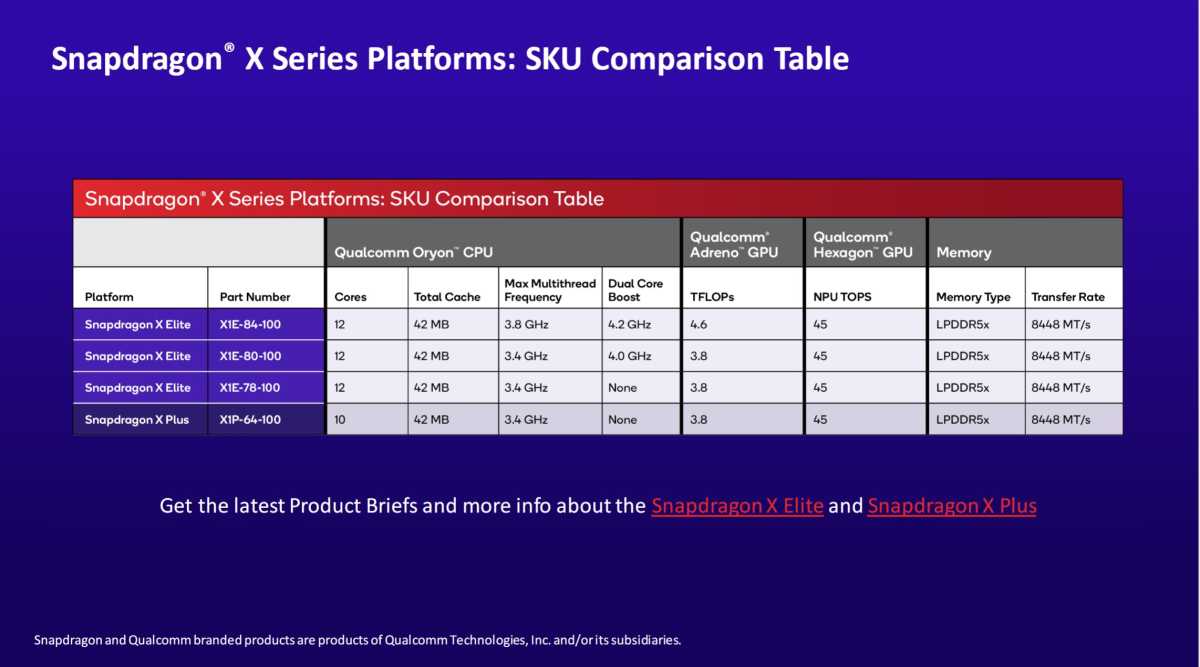Qualcomm is now breaking down exactly how fast each of its new Snapdragon X Elite and Plus Arm processors are…but with a list of chips and a product number decoder that is virtually impenetrable to read, let alone say.
Let’s face it: Processor naming schemes have become ridiculously complex. AMD launched its with an actual decoder ring, and the names still don’t make sense. But Intel began this nonsense more than five years ago, when trying to figure out what the 10th-gen Core chip names meant necessitated its own story.
Now it’s Qualcomm’s turn. And boy, is it a doozy. (Qualcomm also released a list of the four Snapdragon X Elite and Plus processors, complete with names and clock speeds — which it hasn’t done before. Unfortunately, before we list those, we have to explain what the names and numbers mean. We apologize in advance. Take note of the similarity to the name of Elon Musk and singer Grimes’ child: X Æ A-12.)
How to talk about the Snapdragon X Series to your teens
Let’s face it: The Snapdragon X1E-78-100 will never be mentioned in polite society. It will not appear in a sonnet, or in a card you send to your spouse for your anniversary. If it is ever mentioned that evening, it will be in anger, with one of you sulking off with the half-finished bottle of chardonnay. These are “names” that practically demand to be opened inside a PDF, or on a mimeographed requisition form that requires seven signatures, some in triplicate. Somewhere, a military supply sergeant’s eyes are lighting up.
Keep in mind that Qualcomm has two brands (the X Elite and the Plus) and four total chips. This naming scheme has room for…how many, exactly? The Bible has less complexity than this.
Qualcomm
I could probably give this a pass if Qualcomm’s naming scheme just ended on the SKU. But there are three whole digits reserved for something in the future. (They’re all just “100,” for now.) A mystery!
So: Snapdragon X1 E (Elite) or P (Plus), plus the standard “bigger number is better” naming scheme. Qualcomm could have just gone with the Snapdragon X Elite 80, say, or the X1E-80. Instead, we have something that looks like a Social Security number.
And are the dashes silent? Or are we really going to have to say “SnapdragonXOneEdashEightyFourdashonehundred” over the phone? C’mon, Qualcomm. There’s an entire generation of older folks who are going to run out of breath and keel over.
The Snapdragon X Elite and Plus: Speeds and feeds
Qualcomm originally launched the Snapdragon X Elite. On Wednesday, it added the Snapdragon X Plus, a slightly cut-down version of the Elite with a slower 3.4GHz clock speed and no turbo boost. Fortunately, there’s only one Snapdragon X Plus name to worry about: the X1P-64-100.
What we didn’t know previously is that the Snapdragon X Elite now has not one, but three chips inside the family: the X1E-84-100, the X1E-80-100, and the X1E-78-100.

Qualcomm
What differentiates one from the other? Differences in turbo clock speed as well as the base clock. While rivals tend to vary both the base clock as well as the turbo clock speed, both the X1E-80-100 and the X1E-78-100 share the same 3.4GHz clock speed.
We don’t know how much variation Qualcomm will introduce in the current generation, or what it plans for the next-gen Qualcomm X2E (see, we’re playing along!). How many more of these crazy chip names could we see? With Qualcomm’s future-proofed naming scheme in place, we could be in for a rough ride.



